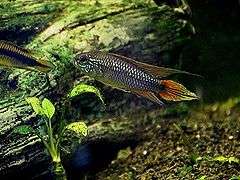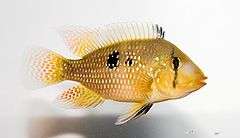Geophaginae
"Eartheater" redirects here. For earth eating in general, see geophagia.
| Geophaginae | |
|---|---|
 | |
 | |
| A dwarf cichlid (Apistogramma agassizii) above, and an eartheater (Geophagus brasiliensis) below | |
| Scientific classification | |
| Kingdom: | Animalia |
| Phylum: | Chordata |
| Class: | Actinopterygii |
| Order: | Perciformes |
| Family: | Cichlidae |
| Subfamily: | Geophaginae Haseman, 1911 |
| Genera | |
|
see text | |
The Geophaginae are a subfamily of cichlid fishes from South America, where they are found as far west as the Andes and as far south as northern Argentina. The subfamily includes about 160 species. A single species, Geophagus crassilabris, is from southernmost Central America. For aquaristic purposes, the subfamily can be divided into two groups based on size, appearance, and to some extent behavior; given soft or sufficiently fine substrate, even dwarf cichlids behave like Geophagus, the "eartheater", and take up, mumble, and spit out sand and fine gravel, stripping it of biofilm nutrients. This grouping, however, does not reflect the phylogenetic relationships of these genera within the geophagine clade:
- Dwarf cichlids, which do not surpass 10 cm (3.9 in) in length, include: Apistogramma, Apistogrammoides, Biotoecus, Crenicara, Dicrossus, Mazarunia, Microgeophagus, and Taeniacara.
- Eartheaters, a range of medium-small to fairly large cichlids, where many species have a habit of picking up large mouthfuls of earth or sand, include: Acarichthys, Biotodoma, Geophagus, Guianacara, Gymnogeophagus, and Satanoperca (the superficially similar Retroculus is sometimes also called eartheater, but is a member of another subfamily).
Genera
- Acarichthys
- Apistogramma
- Apistogrammoides
- Biotodoma
- Biotoecus
- Crenicara
- Dicrossus
- Geophagus
- Guianacara
- Gymnogeophagus
- Mazarunia
- Mikrogeophagus
- Satanoperca
- Taeniacara
External links
| Wikimedia Commons has media related to Geophaginae. |
| Wikispecies has information related to: Geophaginae |
This article is issued from Wikipedia - version of the 2/15/2016. The text is available under the Creative Commons Attribution/Share Alike but additional terms may apply for the media files.